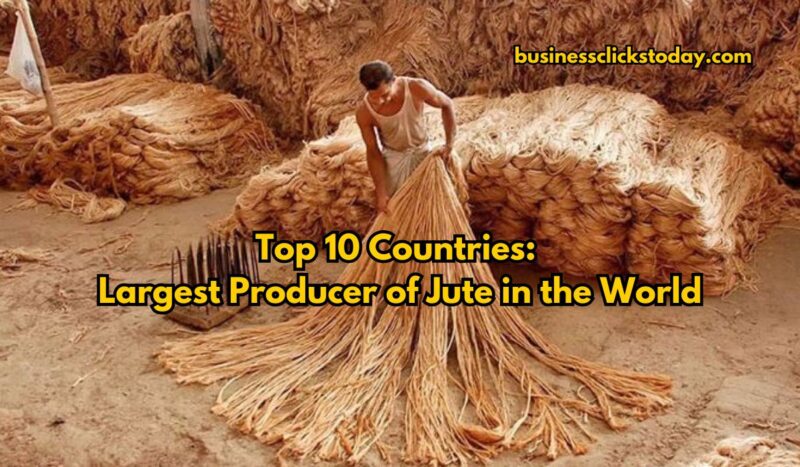Jute, often referred to as “The Golden Fiber,” is an essential natural fiber with substantial global demand. Its popularity stems from its eco-friendly nature and versatility, making it valuable across various industries. To meet the world’s growing need for jute, several countries have emerged as key players. Here’s a look at the top 10 Largest Producer Of Jute In The World.
Top 10 Largest Producer Of Jute In The World
1. India – 1,720,000 tons
India stands as the largest producer of jute in the world, with an impressive output of 1,720,000 tons. This dominance is attributed to India’s favorable soil conditions, warm climate, and long-standing tradition of jute cultivation. The country’s proximity to the Ganges Delta, the world’s largest jute-producing region, further enhances its production capabilities. India’s jute industry is heavily concentrated in West Bengal, where the fertile soil and ideal climate significantly boost output. The country’s commitment to sustainable jute cultivation not only supports its position as the leading producer but also aligns with global demands for eco-friendly products, contributing to environmental conservation.
2. Bangladesh – 1,681,939 tons
Following India, Bangladesh is the second-largest jute producer, with a total of 1,681,939 tons. The country’s agricultural and economic frameworks heavily rely on jute production. Access to the Ganges Delta, similar to India, plays a crucial role in its high output. Bangladesh’s jute industry benefits from extensive research and development efforts, which enhance farming efficiency and sustainability. The country’s dedication to eco-friendly practices solidifies its role as a significant jute producer, addressing global environmental challenges and contributing to the green movement.
3. Uzbekistan – 19,099 tons
Uzbekistan ranks third in global jute production with 19,099 tons. Despite its relatively lower output compared to the top producers, the country’s efforts to diversify its agricultural portfolio have positioned it as a noteworthy jute producer. Uzbekistan’s jute cultivation supports environmental goals and local agriculture, reflecting its commitment to sustainable practices. The nation’s contribution to jute production highlights its role in promoting agricultural sustainability and resilience.
4. China – 15,700 tons
China, with 15,700 tons of jute production, is the fourth-largest producer. The country’s extensive agricultural land and advanced farming technologies contribute to its growing jute industry. Although not as dominant as India or Bangladesh, China’s increasing jute output underscores its adaptability and commitment to meeting the rising demand for eco-friendly products. The country’s engagement in jute production is part of a broader trend towards sustainability and environmental responsibility.
5. Nepal – 10,451 tons
Nepal produces 10,451 tons of jute, ranking sixth globally. The country’s focus on sustainable and organic jute cultivation sets it apart. Nepal’s climate and geographical conditions are ideal for jute farming, which supports its industrial growth. The nation’s dedication to sustainable agriculture aligns with global trends towards eco-friendly products, making Nepal a significant player in the jute market.
6. South Sudan – 3,720 tons
South Sudan, with a production of 3,720 tons, is the sixth-largest jute producer. Despite facing various challenges, the country’s advancements in jute farming demonstrate its potential for agricultural development and economic growth. South Sudan’s commitment to utilizing its resources and diversifying agricultural production contributes to global agricultural resilience and sustainability.
7. Zimbabwe – 2,692 tons
Zimbabwe ranks seventh in global jute production, contributing 2,692 tons. The country’s jute industry reflects its agricultural resilience and adaptability. Despite facing challenges in the agriculture sector, Zimbabwe’s continued production of jute showcases the fiber’s versatility and the country’s dedication to sustainable practices. Zimbabwe’s role in the jute market underscores its importance in the global shift towards eco-friendly materials.
8. Egypt – 2,283 tons
Egypt, producing 2,283 tons of jute, is the ninth-largest producer. The nation combines traditional agricultural methods with modern farming technologies to maintain a steady output. Egypt’s involvement in jute production highlights its agricultural heritage and commitment to sustainability, aligning with the global trend towards environmentally friendly materials.
9. Vietnam – 428 tons
Vietnam ranks ninth in jute production with 428 tons. Although its output is modest compared to leading producers, Vietnam’s increasing interest in jute reflects a growing focus on sustainable materials. The country’s jute production contributes to agricultural sustainability and aligns with the global shift towards eco-friendly products.
10. Bhutan – 343 tons
Bhutan, with a production of 343 tons, is the tenth-largest jute producer. Despite its small output, Bhutan’s emphasis on traditional agricultural practices and eco-friendly materials underscores the cultural and environmental significance of jute. The country’s commitment to sustainable agriculture and cultural preservation positions it as a responsible player in the global jute market.
Conclusion
The global jute market is dynamic and continually evolving, with these top 10 countries leading the way in production. As the largest producer of jute in the world, India plays a pivotal role in meeting global demand for this versatile and eco-friendly fiber. The growing emphasis on sustainability and environmental responsibility highlights the importance of jute in addressing environmental challenges. These leading jute-producing nations contribute significantly to the global shift towards greener alternatives, reinforcing jute’s role as a crucial element in the fight against environmental pollution.
















